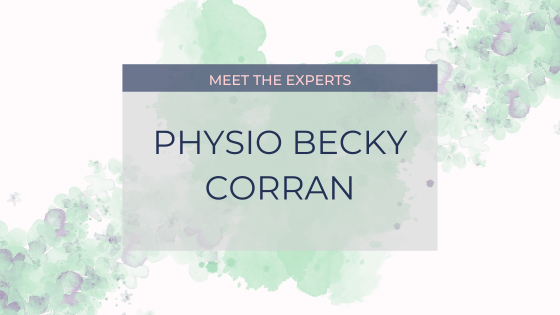Your body undergoes changes during pregnancy and birth which can lead to many questions about sex after having a baby. When will it happen again? Will it feel different? Will it be painful? Will I ever get enough sleep to even think about it at all?
Thankfully Womens Health Physiotherapist Sinéad McCarthy is here to help us understand the changes our bodies go through and explain there really is no “normal” when it comes to sex after a baby.
Sex and the Pelvic Floor
"Our pelvic floor muscles and tissues of the perineum (the area between the vagina and the back passage) are at the base of our pelvis working all the time to support the bladder, bowels and abdominal organs, keep us continent, provide control and stability around the pelvic joints, facilitate childbirth and have an important role in sexual activity. Often, their role in sexual function is considered last, or least important in medical terms, but to many this is the most valuable.
Childbirth
During childbirth these pelvic floor muscles and perineal tissues are designed to lengthen, stretch and accommodate the delivery of your baby. It has a lot of stretching to do but can recover really well. In some cases when the tissues are under a lot of pressure a natural tear can happen during delivery, or alternatively your midwife or obstetrician may need to perform a small cut (episiotomy) in order to safely deliver your baby. This tear or cut will be stitched or sutured afterwards. In the same way as any other part of the body, the area around the stitches may have some swelling, bruising or tenderness. This may leave the surrounding muscles weak and not functioning well, causing some bladder or bowel weakness, vaginal heaviness or soreness. It is also not uncommon that simply the significant stretching in delivery can cause some of these symptoms without having needed any stitches.
The First Weeks of Healing
During the first few weeks after delivery these muscles and tissues will heal up really well by simply taking it a bit easier, keeping the skin clean and dry and starting some gentle pelvic floor muscle exercises to improve the circulation. You can protect your perineum and pelvic floor as it heals by minimising any heavy lifting apart from caring for your baby, stick to gentle low impact exercise such as light walking and make sure to look after your bladder and bowels. Drink enough water, especially if breastfeeding, and eat a well-balanced diet with enough fruit, veggies, fibre and wholegrains. Simple things like using a footstool when you are sitting on the toilet and taking your time to empty the bowels without overstraining can be really beneficial at this time. Your pelvic floor muscles and perineum will heal, become stronger and any pain will reduce, and this is when a lot of women begin to think about having sex again.
Returning to Sex
Making this decision is entirely personal and individual. Some women will wait just a few weeks, others a few months and some even longer. It’s important to feel that you are comfortable and happy to give it a try. Often your doctor will advise waiting at least six weeks for optimal healing but this is just a guideline. Postnatally, it is a busy time for you and your partner, sleep is at a premium, having a new baby in the house can be stressful, your hormones will be still just starting to settle down and sex may be the last thing on your mind!
Some women take longer for bleeding to subside, and healing times can be variable. Our hormones are changing and readjusting post-pregnancy and this will be different in every woman. These changes can affect us emotionally and physically and it’s important to listen to your body and trust your own instincts.
When you’re ready, it is common to find that intimacy may initially feel different to how it has previously. Hormonal changes can affect our own natural lubrication and postnatally, especially if you are breastfeeding, you may feel some vaginal dryness. This can be true even if you have had a Caesarean Section. It can really help to use lots of extra lubrication and perhaps even having some to use initially just in case can make things feel a lot better. Oil-based lubricants can be very comfortable to use, but there are also a range of great water-based alternatives if you are using condoms as your preferred contraception. Remember, even early post-natally or when breastfeeding, contraception is vital if you are not planning a subsequent pregnancy.
Pain is Never O.K.

If you feel any soreness, burning sensation or tightness around the area where you had your stitches don’t let this frighten you. It is common for scar tissue to be a little tighter and less flexible than the tissue around it and the surrounding muscles may also have some tension or not be functioning at their best. Once the scar has healed up you can help to improve this soreness by using a little bit of your lubricant to do some massage on and around the scar. Breathing slowly and deeply into the abdomen and diaphragm whilst relaxing the pelvic floor muscles as you massage can release some tension. This massage can improve its mobility, reduce friction and make the stretch and movement with intercourse feel better. Sometimes there can be some soreness and muscle tension even if you haven’t had any stitches and pelvic floor muscle physiotherapy can help.
Sex after having a baby may feel a little different initially but it should certainly still be enjoyable. Don’t accept pain or discomfort as the ‘new normal’. If you have any doubts about your scar, it’s healing or your pelvic floor muscles talk to your GP or have a postnatal assessment with a Specialist Women’s Health Physiotherapist. The physiotherapist will assess your pelvic floor muscles and your scar, address any bladder, bowel or vaginal symptoms, and advise you on the best route to reduce soreness and make intimacy more pleasureable again."





